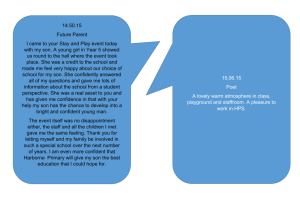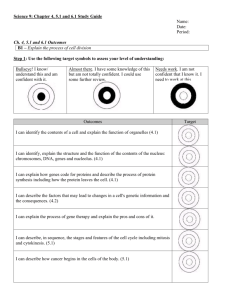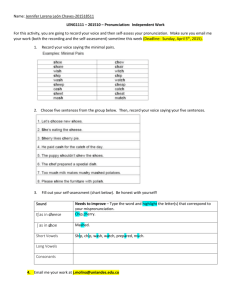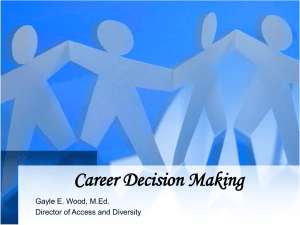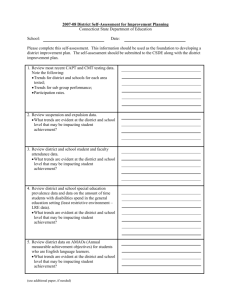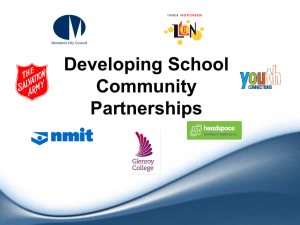Senior Executive Self
advertisement
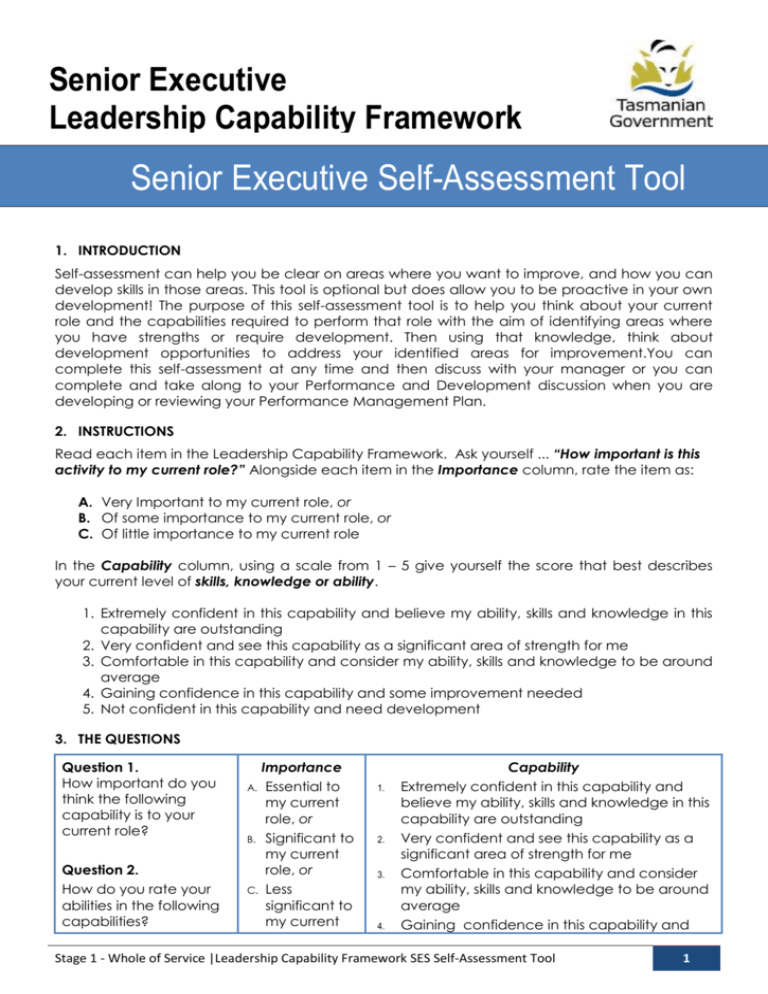
Senior Executive Leadership Capability Framework Senior Executive Self-Assessment Tool 1. INTRODUCTION Self-assessment can help you be clear on areas where you want to improve, and how you can develop skills in those areas. This tool is optional but does allow you to be proactive in your own development! The purpose of this self-assessment tool is to help you think about your current role and the capabilities required to perform that role with the aim of identifying areas where you have strengths or require development. Then using that knowledge, think about development opportunities to address your identified areas for improvement.You can complete this self-assessment at any time and then discuss with your manager or you can complete and take along to your Performance and Development discussion when you are developing or reviewing your Performance Management Plan. 2. INSTRUCTIONS Read each item in the Leadership Capability Framework. Ask yourself ... “How important is this activity to my current role?” Alongside each item in the Importance column, rate the item as: A. Very Important to my current role, or B. Of some importance to my current role, or C. Of little importance to my current role In the Capability column, using a scale from 1 – 5 give yourself the score that best describes your current level of skills, knowledge or ability. 1. Extremely confident in this capability and believe my ability, skills and knowledge in this capability are outstanding 2. Very confident and see this capability as a significant area of strength for me 3. Comfortable in this capability and consider my ability, skills and knowledge to be around average 4. Gaining confidence in this capability and some improvement needed 5. Not confident in this capability and need development 3. THE QUESTIONS Question 1. How important do you think the following capability is to your current role? Question 2. How do you rate your abilities in the following capabilities? Importance A. B. C. Essential to my current role, or Significant to my current role, or Less significant to my current Capability 1. 2. 3. 4. Extremely confident in this capability and believe my ability, skills and knowledge in this capability are outstanding Very confident and see this capability as a significant area of strength for me Comfortable in this capability and consider my ability, skills and knowledge to be around average Gaining confidence in this capability and Stage 1 - Whole of Service |Leadership Capability Framework SES Self-Assessment Tool 1 role 5. some improvement needed Not confident in this capability and need development Stage 1 - Whole of Service |Leadership Capability Framework SES Self-Assessment Tool 2 4. A QUICK REVIEW AGAINST THE CAPABILITIES: Question 1. How important do you think the following capability is to your current role? Question 2. How do you rate your abilities in the following capabilities? Importance Capability A. Very Important to my current role, or B. Of some importance to my current role, or C. Of little importance to my current role 1. Extremely confident in this capability and believe my ability, skills and knowledge are outstanding 2. Very confident and see this capability as a significant area of strength for me 3. Comfortable in this capability and consider my ability, skills and knowledge to be around average 4. Gaining confidence in this capability and some improvement needed 5. Not confident in this capability and need development Shapes Strategic Thinking - Inspires a sense of purpose and direction - Focuses strategically - Harnesses information and opportunities - Shows judgement, intelligence and common sense Achieves Results - Builds organisational capability and responsiveness - Harnesses professional expertise - Steers and implements change and deals with uncertainty - Ensures closure and delivers on intended results Cultivates Productive Working Relationships - Nurtures internal and external relationships - Facilitates cooperation and partnerships - Values individual differences and diversity - Guides, mentors and develops people Exemplifies Personal Drive and Integrity - Demonstrates professionalism and probity - Engages with risk and shows personal courage - Commits to action - Displays resilience and adaptability - Demonstrates self-awareness and a commitment to personal development Communicates with influence - Communicates clearly - Listens, understands and adapts to audience - Negotiates persuasively Stage 1 - Whole of Service |Leadership Capability Framework SES Self-Assessment Tool 3 5. A MORE DETAILED REVIEW AGAINST EACH CAPABILITY: SHAPES STRATEGIC THINKING INSPIRES A SENSE OF PURPOSE AND DIRECTION FOCUSES STRATEGICALLY HARNESSES INFORMATION AND OPPORTUNITIES SHOWS JUDGEMENT, INTELLIGENCE AND COMMONSENSE Priority for Development Confident Needs development Needs significant development Current level of capability Essential A transformative leader … Capabilities required for role Significant Behavioural Descriptors Less Significant Capabilities Contributes to, shapes and champions the organisation's vision and goals, relating these to government requirements. Translates broad strategy into practical terms for others, and creates a shared understanding of what has to be achieved. Within the overall strategic context, presents others with an integrated picture of the actions and priorities that will be required. Provides a clear sense of direction and strives to achieve common understanding among all levels within the organisation. Develops expert advice to government on potential outcomes, and develops a long term perspective on organisational success. Integrates a 'big picture' view of community and government goals with how to achieve them. Operates on the basis of a 'whole of government' framework and takes the broader context into account. Ensures portfolio effort contributes to crossgovernment priorities. Envisages what might be and how future possibilities balance with the 'here and now'. Seeks to acquire appropriate and expert knowledge, and is open to new information and different perspectives. Values and actively finds out about Australian and international best practice (public and private sector) and considers the workings of the organisation within this context. Demonstrates business acumen by thoroughly researching the market that the organisation operates in (and opportunities offered and constraints imposed) to achieve greater efficiencies and improve quality of service. Keeps abreast of major technological changes and advancements and their impacts. Grasps complexity and identifies issues that tend to be overlooked by others. Thinks through problems from various viewpoints and analyses them objectively. Critically evaluates information before applying both intellect and experience to final judgment. Willing and able to question traditional assumptions and practices. Capacity to provide originality of thought and develop innovative solutions. Stage 1 - Whole of Service |Leadership Capability Framework SES Self-Assessment Tool 4 ACHIEVES RESULTS BUILDS ORGANISATIONAL CAPABILITY AND RESPONSIVENESS HARNESSES PROFESSIONAL EXPERTISE STEERS AND IMPLEMENTS CHANGE AND DEALS WITH UNCERTAINTY ENSURES CLOSURE AND DELIVERS ON INTENDED RESULTS Priority for Development Confident Needs development Needs significant development Current level of capability Essential A transformative leader … Capabilities required for role Significant Behavioural Descriptors Less Significant Capabilities Initiates fluid and flexible resourcing options based on an appreciation of emerging requirements in a constantly changing environment. Works across organisational boundaries to identify what resourcing combinations will deliver the best outcomes. Responds flexibly to stakeholder requirements and changing circumstances as they arise, varying deployment of resources within imposed constraints. Uses the advantages offered by information technology. Takes action to ensure sustainability. Values specialist/technical expertise and places emphasis upon creating an environment which facilitates the sharing and effective use of professional knowledge and skills. Ensures relevant professional input from others is obtained and shared. Develops and oversees the implementation of change initiatives in a sometimes uncertain environment and often in the face of organisational resistance. Defines high level objectives and ensures translation into practical implementation strategies that are monitored and evaluated. Undertakes both long and short term planning phases and sets timeframes and allocates resources for completion. Engenders a culture of achievement, by ensuring ideas and intended actions become reality and that planned projects actually result in expected outputs and outcomes. Establishes systems and processes to measure and evaluate accountabilities. Stage 1 - Whole of Service |Leadership Capability Framework SES Self-Assessment Tool 5 CULTIVATES PRODUCTIVE WORKING RELATIONSHIPS NURTURES INTERNAL AND EXTERNAL RELATIONSHIPS FACILITATES COOPERATION AND PARTNERSHIPS VALUES INDIVIDUAL DIFFERENCES AND DIVERSITY GUIDES, MENTORS AND DEVELOPS PEOPLE Priority for Development Confident Needs development Needs significant development Current level of capability Essential An engaging leader … Capabilities required for role Significant Behavioural Descriptors Less Significant Capabilities Builds relationships with Ministers and with key people within the organisation, across the State Service and with external organisations. Proactively creates a professional network and develops mutually beneficial relationships based on respect and trust. Models commitment to customer service and delivery. Supports and guides the development of a work environment where people work together and value collaboration and teamwork. Works in partnership with colleagues across the Service and creates a sense of ‘interconnectedness’ with other departments and agencies, ensuring opportunities to share views and ideas. Demonstrates strong interpersonal skills by encouraging and modelling 'team-player' behaviour, including a willingness to consult, engage and listen. Supports and respects the individuality of others and recognises the benefits of diversity of ideas and approaches. Recognises different skill areas and levels of expertise. Understands others and responds in an appropriate and respectful manner. Inspires ongoing learning and development in others. Gives timely recognition for good team/individual performance. Motivates and supports others with enthusiasm by setting challenging goals, as well as supporting and encouraging them when they need assistance to overcome problems. Helps others to address areas of weakness by encouraging them to take an active role in their own learning and development, and creating a climate with right opportunities to do so. Understands when it is appropriate to confront issues and takes action to deal with difficult performance situations. Stage 1 - Whole of Service |Leadership Capability Framework SES Self-Assessment Tool 6 EXEMPLIFIES PERSONAL DRIVE AND INTEGRITY DEMONSTRATES PROFESSIONALISM AND PROBITY ENGAGES WITH RISK AND SHOWS PERSONAL COURAGE COMMITS TO ACTION Priority for Development Confident Needs development Needs significant development Current level of capability Essential A self-aware leader … Capabilities required for role Significant Behavioural Descriptors Less Significant Capabilities Adheres to and promotes State Service Principles and the ethical framework as set out in the State Service Code of Conduct and through Agency Values. Serves the government of the day irrespective of personal preferences. Implements policies and programs based on corporate decisions. Is prepared to be forthright and 'tell it like it is'. Is independently minded and willing to challenge ideas and confront issues. Is prepared to acknowledge when in the wrong, and learns from mistakes. Is prepared to ask for help and values advice from others. Is determined, highly motivated and action-oriented. Takes responsibility for getting things done, and for the success of the organisation. Handles issues proactively and shapes events. DISPLAYS RESILIENCE AND ADAPTABILITY DEMONSTRATES SELF AWARENESS AND A COMMITMENT TO PERSONAL DEVELOPMENT Doesn't procrastinate but seeks to take the initiative and make things happen. Readily invests energy and initiative into progressing work. Deals resiliently with work pressures and negative criticism by maintaining an optimistic outlook and developing and applying effective wellbeing strategies. Remains focused on the objectives even in difficult and uncertain circumstances and in a rapidly changing environment or changing priorities. After setbacks, remains positive, motivated and focussed. Maintains energy and willingly invests extra effort when required. Shows strong commitment to continued learning and development and looks for opportunities to enhance own skills. Actively seeks feedback from a wide range of sources and acts on this. Takes responsibility for own development and for managing self to enable sustained performance. Values continuing learning and development. Stage 1 - Whole of Service |Leadership Capability Framework SES Self-Assessment Tool 7 COMMUNICATES WITH INFLUENCE COMMUNICATES CLEARLY LISTENS, UNDERSTANDS AND ADAPTS TO AUDIENCE NEGOTIATES PERSUASIVELY Priority for Development Confident Needs development Needs significant development Current level of capability Essential A self-aware leader … Capabilities required for role Significant Behavioural Descriptors Less Significant Capabilities Produces user-friendly verbal and written communication that is clear and concise. Ensures unambiguous delivery of the message, and checks that it has been understood as intended. Keeps people up to date and fully informed of any changes to the original communication. Listens actively to ensure views and information are properly exchanged. Checks with others to ensure their views have been accurately understood. Uses and adapts style as necessary to meet the requirements of the audience. Creates opportunities to listen to those whose input can add value. Establishes credibility and approaches negotiations persuasively. Offers a convincing rationale which has been thought through in advance and carefully positioned with reference to desired organisational outcomes and/or Service goals. Allows for a genuine contest of ideas and pulls disparate views into a coherent position, and finds common ground to facilitate agreement and acceptance of mutually beneficial solutions. Reaches negotiated positions, through compromise, which lead to the achievement of the required outcomes. Stage 1 - Whole of Service |Leadership Capability Framework SES Self-Assessment Tool 8 6. ASSESSMENT OF MY REVIEW AGAINST THE CAPABILITIES: What are my major strengths? What are my areas for improvement / development? Activities to assist my development in my identified areas for improvement: (*Remember development opportunities do not always mean attending a workshop, they could consist of a number of things including mentoring, shadowing, stretch projects, acting up, sideways moves etc.) Stage 1 - Whole of Service |Leadership Capability Framework SES Self-Assessment Tool 9 Stage 1 - Whole of Service |Leadership Capability Framework SES Self-Assessment Tool 10 7. POSSIBLE LEARNING OPPORTUNITIES E-learning and technology Many agencies have online and technology based development opportunities available that can be completed in your own time Visits and observations Visits and observation can allow your staff to observe examples of good practice and/or work with experts in their area of interest. Shadowing Shadowing an experienced Senior Executive or equivalent can allow your employees to learn from the experience of others in the workplace. Courses Formal education (such as certificates, diplomas and degrees) and training courses (such as workshops, seminars and conferences). New projects Getting involved in new or more complex projects can be an opportunity to develop more complex techniques and learn from more experienced colleagues. Coaching and mentoring Having experience employees provide feedback and assistance to less experienced employees can be a valuable source of development. Secondment Employees looking to broaden their career experience may be interested in a secondment in another agency. Rotations Rotating around a range of different positions is a good opportunity to learn about different functions within the agency and develop a broad understanding of business functions Committees and working groups Taking part in specialised committees and working groups allow employees to broaden their experience outside of their job role. Networking Capitalising on networking opportunities and joining professional associations can provide opportunities for further development. Reading Book, journals, discussion papers and professional magazines can be a valuable source of up-to-date research, information and resources. Job rotations Rotating job duties is a simple way to broaden the possible development experiences and share knowledge and Stage 1 - Whole of Service |Leadership Capability Framework SES Self-Assessment Tool 11 resources. Stage 1 - Whole of Service |Leadership Capability Framework SES Self-Assessment Tool 12

